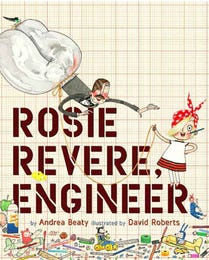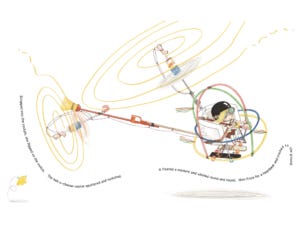Welcome to Write More! This is your mid-month pop-in, which comes with ideas, encouragement, and writing prompts to keep you going. I also send out a monthly intentions email on the last Sunday before a new month starts that aims to help you think through your goals and intentions for your writing practice in the coming month and to reflect on your progress in the previous month.
If you’d like to join us, subscribe here!
Hi, guys. I have been struggling in my writing the last few days—like, maybe I will just slink into the woods and never write again rather than continue laboring through these revisions kind of struggling—and I wanted to write to you to share something that’s helping me today, in case any of you are in a similar tough spot.
My seven year old’s been wanting to read picture books together again recently, and this morning, he brought me Rosie Revere, Engineer. Do you know Andrea Beaty’s wonderful books? We’ve got a couple of them, and they’re all great, but I have a special soft spot for Rosie Revere, in large part because it’s a beautifully written book about embracing failure as part of the creative process.
Rosie is a second grader who dreams up amazing inventions—a hot dog dispenser, helium pants, but who starts hiding her projects after her Uncle Fred laughs at the python-repelling cheese hat she’s made him. (Uncle Fred seems like a not-bad guy who’s genuinely delighted with Rosie’s wild invention, but she’s crushed by him laughing at her. It’s a good reminder of how painful it is as a child to not be taken seriously as adults. Did we all have an Uncle Fred at some point in her childhoods?)
When her Great-Great Aunt Rose comes to visit, though, Rosie is inspired to try again, and she spends all night inventing an amazing heli-o-cheese-copter. Rosie’s copter flies for one moment before crashing.
Rosie turns to find Aunt Rose laughing at her. Rosie is again crushed and resolves to never again try to invent anything—but Aunt Rose has entirely different take on it:
“Your brilliant first flop was a raging success.
Come on, let’s get busy and on to the next!”
She handed a notebook to Rosie Revere,
who smiled at her aunt as it all became clear.
Life might have its failures, but this was not it.
The only true failure can come if you quit.
That line about the brilliant first flop never fails to move me. What if we reimagined all our bad early drafts, all our failed little nubs, all the rejected poems or essays as brilliant first flops—not failures at all, but an essential step toward the next thing? One more thing I love about this book: it doesn’t end with a glorious flight or a flawless invention, but instead with a whole classroom of second graders working on wild creations, and “with each perfect failure, they all stand and cheer.” So maybe the end point of all that creative energy isn’t perfection—maybe the creation itself is the point.
a few ideas, if you’re struggling
Reframe your goals. Rather trying to make something perfect, think about one small way you can move your work forward.
Put a boundary around your work time. I’ve been thinking a lot about this essay by Lisa Whittington-Hill about Top Chef, perfectionism, and writing with OCD. It’s worth clicking through to read the whole thing, but a quick takeaway: embrace the show’s “hands up, utensils down” approach by working with a timer. Whittington-Hill explains: “I allocated a certain amount of time to each task, and when the time was up, the task was done.”
Ask for help. If you’re feeling really stuck, even just articulating why you’re stuck and where—talking to a person, explaining in the comments box in a word doc, or just recording a voice memo for yourself—can be the first step in getting unstuck.
One other thought, from Mason Currey’s newsletter, about what it means when you feel stuck:
But if there’s one thing that I’ve learned personally and also through researching the work lives of writers and artists, it’s that when you feel stuck, that’s actually when you’re making the most progress. It’s the condition of being stuck—of trying things out and not being happy with the results, trying different approaches and still not being happy, flailing around in frustration, starting over, starting over again—that fosters growth, though you might not know it at the time.
(This also reminded me of my conversation with Keri Bertino from this past summer, when she told me that a feeling of despair about your project often happens right before a big breakthrough.)
Happy writing, all! Let me know how it’s going. (And wish me luck as I get back to my own revisions.)
I’ll be back on Sunday with the monthly intentions email for December (!) and some thoughts on seeking out joy in your writing practice.
Write More, Be Less Careful is a newsletter about why writing is hard & how to do it anyway. Have a tip or writing practice you’d like to share? A challenge you’d like help with? Reply to this email, comment below, or find me on twitter (@nancy_reddy) and instagram (@nancy.o.reddy).
If you’ve enjoyed this newsletter, I’d love it if you would share it or send it to a friend.







Nancy, I just scrolled down in my in-box to this November post I hadn't seen. It was waiting for me exactly today when I am totally frustrated rewriting/reinventing something for the fourth time. I appreciate your words of encouragement. This is in fact the process, and I like the idea of raising your hands. STOP it's done. I think, what I figured out today is that there's a reason I can't finish (that I am not clear on yet) and what I may need to do is STOP, give it up for now. Heretical! Maybe I can use components, the wonderful moments, in a future essay or poem. And turn now to other important projects on the line-up.